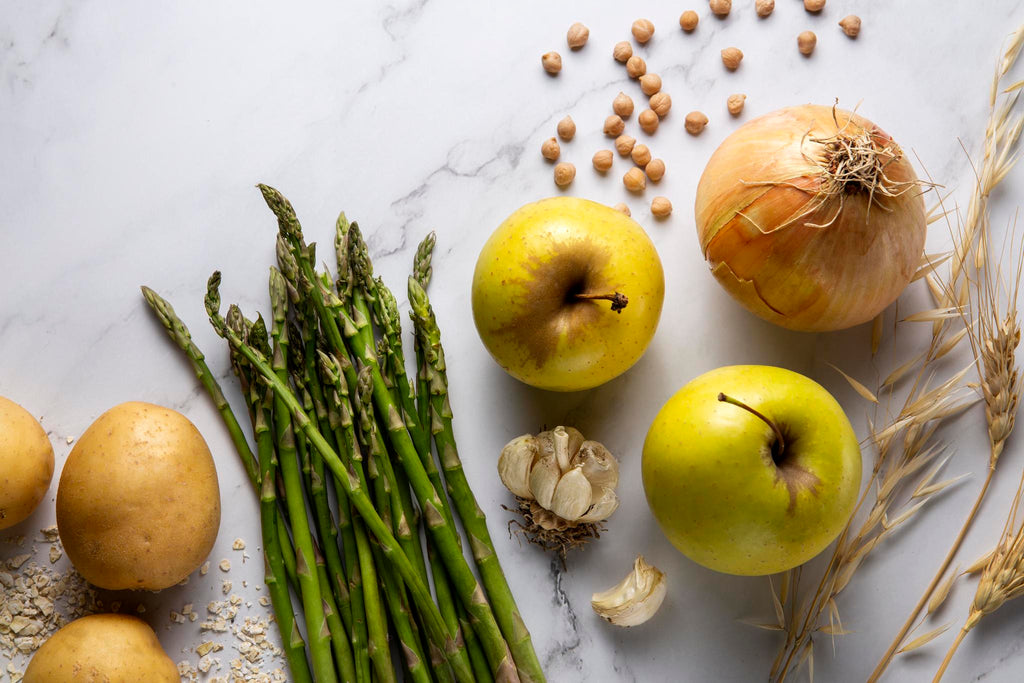Happy gut, healthy you! Add these nine prebiotics to your diet to keep your gut microbiome thriving.
Did you know that the lining of your gut is covered in millions of microscopic organisms like bacteria? The gut microbiome, which is a micro-ecosystem made up of these organisms, is important for maintaining your health and has a significant impact on your mood and behavior. If the balance of the gut microbiome is disrupted, it can lead to various health problems, such as inflammatory bowel disease, obesity and mental health issues. Therefore, it is crucial to maintain a healthy gut microbiome.
Prebiotics can help support a healthy gut microbiome. Prebiotics are indigestible carbohydrates that feed the good bacteria in your gut. Here are nine prebiotics that you can add to your diet to promote a healthy gut microbiome:
Beans and legumes

Beans and legumes are among the best prebiotic-rich foods. They are loaded with oligosaccharides that improve digestion by feeding good gut bacteria. I recommend soaking your beans and legumes overnight and thoroughly cooking them.
Dark chocolate
Do you love eating chocolate? We have good news for you! Dark chocolate is an excellent source of prebiotics. The polyphenols found in dark chocolate act as fuel for your gut microbes. Additionally, cocoa is also a prebiotic, a type of fiber that your gut bacteria digests to boost digestion.
Apples
Unpeeled apples are a rich source of prebiotics like pectin. Prebiotic pectin is known to be resistant to the digestive enzymes pepsin, trypsin and rennet and is not broken down by human saliva or stomach acid. Instead, it produces a gel in your digestive system after ingestion, a process that has several positive effects on your health, including lowering cholesterol. Pectin accomplishes this by forming a bond with cholesterol in the gastrointestinal tract, preventing it from being absorbed and promoting cardiovascular health. It raises the concentration of butyrate, a short-chain fatty acid that feeds the beneficial bacteria in our intestinal microbiota and promotes their growth
Garlic
Garlic serves as a prebiotic by encouraging the development of beneficial Bifidobacteria in the gut. Additionally, it aids in preventing the growth of bacteria that cause disease. Garlic's prebiotic properties are due to its fructan content. According to a study that appeared in The Scientific World Journal, fructans are beneficial food components that function as prebiotics.
Jerusalem artichokes
The Jerusalem artichoke, also referred to as the sunroot, sunchoke or earth apple, is a member of the sunflower family, and has many health advantages. But did you know it is also an excellent source of prebiotics that can help support your gut microbiome? With a sunflower-like appearance, the vegetable offers about two grams of inulin-rich dietary fiber per 100 grams. Inulin can improve bowel regularity and reduce the risk of colon cancer.
Leeks
The green and white parts of leeks are an excellent source of prebiotics. Because leeks are nutrient-dense foods, they have few calories but are rich in vitamins and minerals. Leeks help break down fat and encourage a healthy gut microbiome because of their inulin content.
Onions
Onions are chock full of gut-friendly prebiotics like inulin and fructooligosaccharides, which stay in the bowel and act as a fertilizer for the good bacteria, thus boosting your digestion and promoting a healthy gut microbiome.
Plantains
Plantains are an excellent way to get your daily dose of prebiotics and curb unhealthy cravings. According to one study conducted in 2020, underripe bananas or plantains contain bioactive substances such as phytosterols and phenolics, as well as resistant starch, a type of prebiotic found in both the pulp and peel that is good for colon health. They also serve as a food source for the probiotic bacterium Lactobacilli.
Potatoes

Potatoes are an excellent source of prebiotics as they contain resistant starch. Resistant starch is not digested in the small intestine and travels intact to the colon, where it is fermented by helpful bacteria. It encourages the development of gut bacteria that produce butyrate and Bifidobacteria, which are known to have immune-stimulating and anti-inflammatory properties. To get the most out of your potatoes, how you cook them is important. The most beneficial method for increasing resistant starch content in potatoes is baking rather than boiling or frying. The potatoes should be cooked and then allowed to cool for at least a few hours in the refrigerator before being consumed to obtain the most resistant starch.
To learn more about prebiotics and how they support your gut microbiome, book a consultation with Dr. Shah here.
